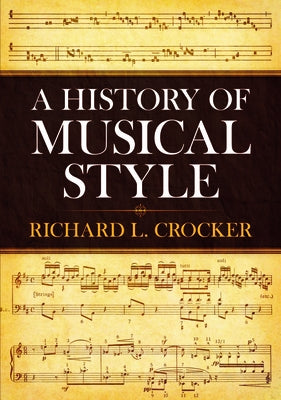Before you leave...
Take 20% off your first order
20% off
Enter the code below at checkout to get 20% off your first order
Discover summer reading lists for all ages & interests!
Find Your Next Read

Style -- the distinctive manner of presentation, construction, and execution in any art -- is a topic of primary importance in music history. This highly regarded text by noted musicologist Richard Crocker (University of California, Berkeley) takes a much-needed fresh look at the subject and attempts to reshape some basic ideas in the light of modern research. Seeking the reasons for stylistic change within the history of style itself (rather than in the history of men or of ideas), this enlightening account shows how music, growing out of its own past, has shaped its own development.
Professor Crocker's exceptionally clear and systematic presentation enables students to easily follow the evolution of Western musical style from Gregorian Chant (ca. 750) to the atonal music of the mid-20th century. The book stresses the continuity of basic musical principles over long periods of history, while it explores in detail moments of high stylistic achievement and the composers who exemplified them.
Drawing of the earliest written records, Crocker begins his description and analysis of Western music's changing style with a discussion of Frankish Gregorian Chant, laudes and melismas, and polyphony -- the leading medium of musical development after 1150. The author traces the progression of new polyphonic forms from the Parisian motet of the 13th and 14th centuries through Italian song forms to the Franco-Flemish style of the 15th and 16th centuries. This sweeping survey then documents the emergence of the Classic Style after 1550, embodied in the music of such composers as Palestrina and Byrd, moves through new Italian dramatic styles (1600-1650) and on to the harmonic and polyphonic contributions of the 17th- and 18th-century masters.
With perception and insight, Crocker traces the creation of the German symphonic style, epitomized in the works of Mozart, Beethoven, and Brahms, and deals with the parallel development of operatic style. An illuminating examination of new styles after 1900, including the serial music of Schoenberg, Webern, and Berg, concludes this exhaustive study.
Over 140 music examples complement Crocker's lucid text, and lists of Selected Study Materials for each chapter are given at the back of the book. This work will be welcomed by music students at all levels, music scholars, and the interested layman as well.
Thanks for subscribing!
This email has been registered!
Take 20% off your first order
Enter the code below at checkout to get 20% off your first order